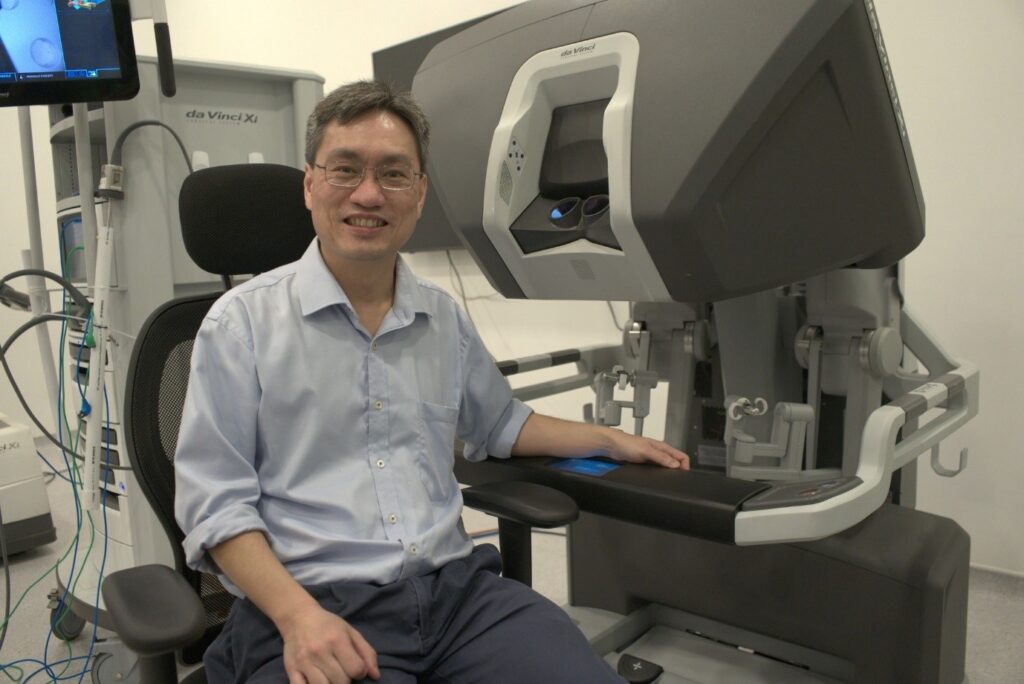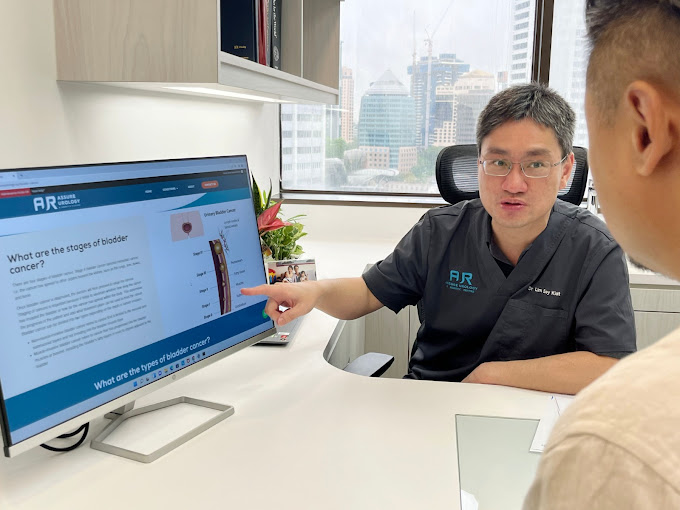A urologist specialises in maintaining the health and proper function of the urinary system and the male reproductive organs. The urinary system includes the kidneys, bladder, ureters, and urethra, while the male reproductive organs consist of the testicles and penis. Urologists play a pivotal role in ensuring the proper functioning of these essential organs, which contribute significantly to an individual’s overall health and quality of life.
Urologists diagnose and treat various urological conditions, such as urinary tract infections (UTIs), kidney stones, and benign prostatic hyperplasia. Medical technology has evolved rapidly in Singapore, enabling urologists to provide personalised treatment options to each patient.
This guide takes a closer look at the scope of urology and explores the typical responsibilities of a urologist. It also covers the conditions treated by a urologist and their diagnostic tools. Lastly, it highlights the importance of preventive measures in maintaining urinary and reproductive health.
The Role of a Urologist
Qualifications and Training
Becoming a urologist demands extensive education and hands-on training. After medical school, aspiring urologists must complete a demanding six years residency programme in Singapore focusing on diagnosing and treating various urological conditions. Some may then choose to pursue subspecialty training in fields such as uro-oncology, female urology, or minimally invasive surgery, including robotic-assisted techniques after they are accredited as urologists.
In Singapore, urologists are expected to meet strict professional and educational requirements before they can start practising. These requirements help ensure patients receive high-quality care from specialists, thus giving them confidence in their treatment outcomes.
Daily Responsibilities
The daily responsibilities of a urologist are as diverse as the patients they treat. They provide holistic care that is tailored to each individual’s needs. A typical consultation with a urologist often includes:
Patient Consultation: Urologists begin by gathering medical histories and discussing symptoms to understand the patient’s condition better.
Diagnostic Procedures: Tests such as ultrasounds, CT scans, and cystoscopy (a procedure to view the bladder and urethra) allow urologists to identify the root causes of various symptoms.
Treatment Planning and Management: Urologists create personalised treatment plans, which may involve prescribing medications, suggesting lifestyle changes, or recommending surgical interventions depending on the diagnosis.
Common Procedures Performed by Urologists
Non-Surgical and Surgical Procedures
Urologists employ a range of interventions, ranging from non-surgical to surgical procedures. Common non-surgical procedures may include:
Prescribing antibiotics to treat UTIs.
Using extracorporeal shock wave lithotripsy (ESWL) in a procedure to break down kidney stones.
Conducting prostate-specific antigen (PSA) tests for early detection of prostate cancer.
For more complex conditions, surgical procedures may be necessary. These surgical procedures range from minor operations, such as circumcision, to major surgeries like nephrectomy (kidney removal).
Robotic-Assisted Surgeries

Robotic-assisted surgery is a minimally invasive procedure in which surgeons use robotic technology to perform operations with precision and control. In recent years, more urologists have adopted this technique to perform complex urological procedures, achieving satisfactory patient outcomes. Dr Terence Lim, the Medical Director and Senior Consultant Urologist at Assure Urology & Robotic Centre, underwent a dedicated fellowship training in Uro-oncology and Robotic Surgery and has participated in over 700 robotic-assisted surgeries and is often invited as a proctor to assist fellow urologists in robotic surgeries.
Robotic-assisted surgery brings several benefits that set it apart from traditional surgical methods. These advantages make it a preferred choice for both patients and surgeons:
Precision: The robotic arms which are being used in these surgeries are designed for micro-movements, enabling accuracy during delicate procedures. This level of precision is particularly critical for operations like prostatectomy (removal of the prostate gland).
Minimally Invasive: Unlike traditional open surgery, robotic-assisted surgeries require smaller incisions, reducing physical trauma to the patient. The smaller incisions result in significantly less blood loss, minimal pain, and quicker recovery times, allowing patients to return to their activities sooner.
Enhanced Visualisation: Robotic systems are equipped with high-definition 3D imaging, offering surgeons a magnified and detailed view of the patient’s anatomy. This visualisation helps urologists identify and preserve critical structures, enhancing the safety and efficacy of the procedure.
Common robot-assisted surgeries that can treat urological conditions include:
Robotic Prostatectomy: A preferred method for treating prostate cancer due to its precision and less invasive on surrounding tissues.
Robotic Partial Nephrectomy: Used for kidney tumour removal while preserving healthy kidney tissue.
Robotic Bladder Surgery: Treats bladder cancer with enhanced outcomes compared to traditional methods.
Robotic-assisted surgeries are often regarded as the future of urology, offering optimal outcomes to patients in Singapore.
Conditions Treated by Urologists
Urologists address a wide array of conditions, such as:
Benign Prostatic Hyperplasia (BPH): Also known as an enlarged prostate, BPH is a common condition affecting older men. 70% of men above 70 years old have BPH. Symptoms include difficulty urinating, frequent urination at night, and a weak urine stream. Treatments range from medication to minimally invasive procedures, such as transurethral resection of the prostate (TURP).
Erectile Dysfunction (ED): ED can stem from physical, psychological, or lifestyle factors. Urologists offer treatments that range from oral medications to options like penile implants or vascular surgery, helping patients regain confidence and quality of life.
ကျောက်ကပ်ကျောက်တည်ခြင်း။: Hard mineral deposits that form inside the kidney can cause severe pain and urinary complications. Urologists manage kidney stones through medication, ESWL, or minimally invasive surgeries to treat and reduce recurrence and ensure patients’ comfort.
ဆီးအိမ်ကင်ဆာ: Bladder cancer requires prompt diagnosis and treatment. Urologists perform cystoscopy and biopsies for early detection and may employ endoscopic or robotic-assisted surgery, chemotherapy, or immunotherapy for severe cases.
When to See a Urologist

Recognising the signs and symptoms of urological conditions is vital for early intervention. Symptoms warranting a visit to a urologist include:
ဆီးတွင်သွေးပါခြင်း (haematuria)
Pain during urination
Frequent or urgent need to urinate
Difficulty achieving or maintaining an erection
Persistent pain in the lower abdomen or back
Importance of Early Diagnosis
Timely consultation with a urologist can significantly improve treatment outcomes for patients with urological issues. Early diagnosis often means less invasive treatments and a higher likelihood of recovery. Proactive care not only addresses immediate symptoms but also prevents long-term complications.
Preparing for a Urology Appointment
Before consulting with a urologist, patients are recommended to prepare these things in advance:
Bring any past medical records they have.
Note symptoms, including their onset and any factors that worsen or relieve them.
Prepare questions for the urologist to ensure all concerns are addressed.
Taking these steps helps streamline the diagnostic process and facilitates effective communication with your healthcare provider.
Schedule an Appointment Today with an Experienced Urologist

If you are experiencing symptoms related to your urinary or reproductive health or want to learn more about preventative care, book a consultation at Assure Urology & Robotic Centre, led by the Medical Director and Senior Consultant Urologist, ဒေါက်တာ Terence Lim.


